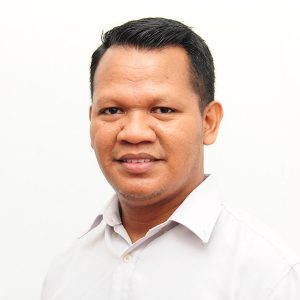…ministers on mission to unite, empower Indigenous peoples
While it has been a challenging two years since assuming office, Minister of Indigenous Peoples Affairs, Sydney Allicock believes the task of uniting the people is foremost on his agenda, noting that despite the earlier setbacks he and his junior minister have gotten themselves in order.
At the same time, Junior Minister Valerie Garrido-Lowe is working to ensure that her supporting role as subject minister is effective as she targets the grassroots issues facing the indigenous communities across the nation. On May 11 , the APNU+AFC government attained two years in office following the 2015 polls. During a recent interview with the two government officials at the ministry’s offices on Quamina Street , Minister Allicock told the Guyana Chronicle that he continues to be honoured having been selected by the government to serve the citizenry.He said the challenges have been “interesting”, “eye-opening “and “real”.
“It is something I have ventured into and has caused me to be thinking all the time “, he said, as he spoke highly of the support he has been receiving from Garrido-Lowe in undertaking the mandate of the ministry. According to Allicock , the electorate in 2015 voted for a change and according to him, it is a process which includes “healing and rearranging “, one which entails creating a platform of readiness for the change to take effect. He said that the challenge for government is to impart knowledge and states its plans “so that the by- in can come its way”.
As regards the ministry, he noted that when the government assumed office, most communities in the Hinterland were divided politically. ”Our task is to try and get people back together,” he said. Minister Lowe noted that her portfolio sees her undertaking the mandate of the government in several ways. She said that there were in-house issues at the ministry which had to be addressed and these included staff-related matters such as becoming acquainted with the office environment.
She said that she believed the ministry was the subject of “pure politics” in the past and according to her the difficulty was working along with some persons who would have been loyal to the previous government. However, she said that there was no form of bias noting that staff was told what was expected to them. She said the foremost interest was to ensure that the staff understood the importance of serving the indigenous people.
When the work of the new administration commenced, the two ministers sat and discussed and divided their responsibilities. “So I took the easy ones, so to speak “, she said with smile. These include women and children issues, youth and sport and welfare matters which were placed as broad headings. One of the first issues which the ministry addressed was the issue of Community Social Officers (CSOs) whom Garrido-Lowe noted were being used for political purposes. “So that $30,000 would be an assistance for you to learn a skill”, she noted of moves the ministry made in creating a beneficial purpose for funds provided to indigenous communities. She said that 2016 have had some successes although there were administrative issues which had to be sorted.
She spoke of the Hinterland Employment and Youth Service (HEYS) programme HEYS which she noted was implemented countrywide. She said that the subject of inclusivity was pushed as the programme was rolled-out. “So you have people from different political divide who are working along with their communities “, she noted.
Garrido-Lowe noted that the programme has had its set-backs but there are more successes. She said since there 112 villages under the programme, there are monitors who would visit and assess the individual projects. She said that while the authorities concentrate on having state of the art facilities, her concern “is very basic for the indigenous people” noting that it is the bread and butter issues which has to be addressed since a family will want to ensure that it has money in its hand to offset its living expenses.
Get play field ready
During the interview, Minister Allicock noted that the aim of the government is to address issues that are critical for the country to move forward. “To get the play field ready “, he noted.
He spoke of issues which had to be ironed-out during his initial stages as a government minister. As an example, he said that following the 2015 elections the Opposition was vocal on claims that the government had dismissed 1000 CSO’s. However, according to him, weeks before the elections the then government had cancelled a cheque which was expected to be paid to the CSOs a month before the May 2015 polls. He said the ministry had the arduous task of addressing the payments.
“So there are many things, we are better off now, now I think we have ourselves in order”, Allicock said.
Successes
According to Allicock, village councils within the South Rupununi has been calling on the authorities to establish a district council in the area. He said that a team of officials led by him, visited the areas and after 3-4 days of intense discussions it was recognised that steps had to be taken in forming the council. “So we eventually had the South Rupununi District Council which has been gazetted”.
He said the aim of the council is being developed by the villages to ensure that they work together. Approximately 13 villages in the south and central savannahs are a part of the council. Allicock also spoke of the Amerindian Land Titling project, which has been extended by two years after it came to an end in October last year. He said a decision was made at the level of the government to request support from Norway and a four year extension was also sought.
He said there are challenges which the ministry encounters in the project, such as villages in the upper Mazaruni which have not consented to being demarcated. The issue is before the courts for a number of years . He noted that the ministry has been unsuccessful in seeking a compromise from the villages and according to him, the Commission of Inquiry (COI) in land matters will assist in the project’s mandate. He said there are 215 communities which fall under the project and as such the task remains an arduous one.
Commended
As regards returning to areas where the government did not receive support, he said that the ministry is following its mandate to serve all of Guyana. He listed as an example, a village close to Lethem where he was vociferously criticised prior to the 2015 elections. He noted that on a recent visit to the village he was commended by the village leader for his efforts and those of the ministry including projects such as the HEYS programme.
As regards the Amerindian Development Fund, he noted that economically viable projects being implemented countrywide. He said there processing projects which will be undertaken in various communities across the country .He said the value-added projects will see items processed in the Hinterland being marketed in the villages as well as on the Coastland and further afield.
There is a medicine project at the Bina Hill institute in the North Rupununi which wills see eight students who will be trained in the capital city in marketing and processing among other areas. He said that there is an order of 25,000 vials of medicine by the end of 2017 and plans are in train to meet the target.
Uniting the people
Allicock said that the ministry is undertaking its programmes, such as the HEYS project , targeting young leaders as well as community development. He spoke of an Indigenous Ambassador’s programme in which nationally acclaimed persons will work along with the ministry. He said a Youth Director will be appointed to develop that venture. Allicock said that there are Community Development Officers (CDOs) who are proving themselves in their respective positions to undertake the mandate of the ministry.
National Toshaos Council
Allicock said that when he assumed his current portfolio and “olive branch “was offered to the NTC, including its executive and members. He said the NTC was asked to produce plans and suggestions for the development of villages across the country. He said that the NTC has not made much of the offer by the ministry.
As regards the COI, he said that the ministry expected the NTC to work along with the ministry as regards the commission but according to him, the hierarchy of the council appears not to be working in the best interest of its expected mandate. “I am saying that we have to come out of the Columbus era, but they (NTC executive ) seem to want to remain in this stagnated era , we are here , and we are poor and we can’t do anything,“ Allicock said.
He continued “we have to move out of that era, you see we have been told so long that we are poor that we believe we are poor “, adding that richness is not necessarily money but a rich culture and history speaks of wealth.
Allicock believes that unity is the only tool which can develop the nation as a whole. At the same time Garrido-Lowe believes education and preservation of the indigenous way of life remains key to the advancement of the nation’s first people.



.jpg)








